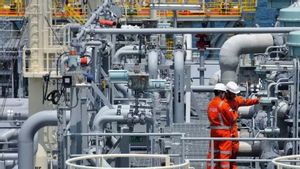YOGYAKARTA In economic science, deflation must also be overcome by the state because these problems can trigger losses for business actors, including the state.
Deflation itself is a condition that is the opposite of inflation. So, what is deflation?
In the Big Indonesian Dictionary (KBBI), deflation has the meaning of increasing currency value, among others, by reducing the amount of banknotes in circulation with the aim of restoring the purchasing power of money whose value has decreased.
In general, deflation is a condition when the prices of goods and services drop drastically, causing the value of the eye to increase.
This condition can happen very quickly. If not handled properly, deflation will cause losses, especially to the state.
If you understand at first glance, deflation does benefit the public as consumers. However, for entrepreneurs and the state, deflation can bring economic conditions to dangerous conditions.
Entrepreneurs in the field of goods or services will suffer losses because the proceeds from the sale are unable to cover their production costs and daily operations.
As previously said, deflation is the opponent of inflation. Differences in deflation and inflation can be seen from the conditions.
Inflation occurs when prices for goods and services increase, causing people's purchasing power to fall due to high prices in the market.
Meanwhile, deflation occurs when the price of goods decreases. This condition occurs because the stock of goods is too abundant.
This condition forces entrepreneurs to lower the price of goods or services so that goods continue to sell in the market. If this situation occurs in the long term, then entrepreneurs are threatened with bankruptcy.
Deflation occurs not without reason. There are several conditions that cause deflation, namely as follows.
Deflation can be triggered when the number of goods stocks or services is abundant at a time. This condition is in accordance with the aging economic law that the more goods in the market, the cheaper the price can even lose its value.
The declining purchasing power of the community can trigger deflation. The reason is, producers will reduce the price of goods or services so that transactions continue to occur. The decline in goods prices can be done on a large scale.
This condition usually occurs when banks raise interest rates to the public. When interest rates rise, people prefer to save their money in the bank because it will benefit from these conditions. When the circulation of money decreases, the wheels of the economy will also stall until it triggers deflation.
In economic science, there are two types of deflation that may occur in a country, namely as follows.
This condition occurs because production and consumption are not balanced so that the economy has decreased. Circulation deflation can also occur because the supply of abundant goods in the market but purchases cannot keep up with it.
Strategic deflation occurs when the strategy carried out by the government and the Central Bank fails to control the level of public consumption.
The impact of deflation can be negative. Some of the impacts that can be felt are as follows.
Negative Impacts
Positive Impacts
One example of deflation that occurs in Indonesia is when the price of food and seasoning commodities falls in 2019.
Even at that time the Central Statistics Agency (BPS) noted that Indonesia experienced deflation of up to 0.27 percent.
The government can take several ways to overcome deflation that disrupts the economy, namely as follows.
That's information related to what deflation is. To get other interesting information, visit VOI.ID.
The English, Chinese, Japanese, Arabic, and French versions are automatically generated by the AI. So there may still be inaccuracies in translating, please always see Indonesian as our main language. (system supported by DigitalSiber.id)













